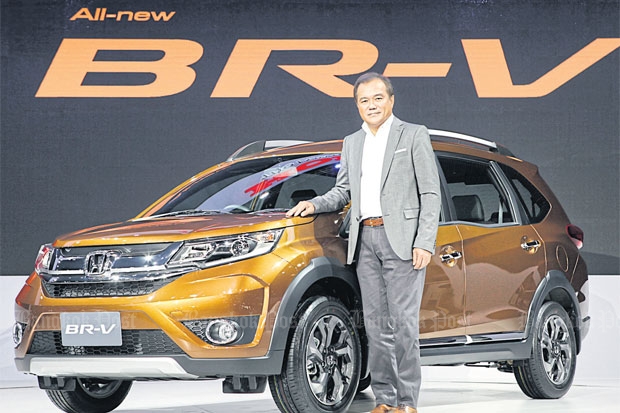
Honda Automobile (Thailand) remains bearish on its sales prospects, citing the country's sluggish economy and a new excise tax.
The Japanese car maker expects flat 2016 sales of about 110,000 vehicles, said chief operating officer Pitak Pruittisarikorn.
"The new excise tax, which takes effect this year, has absorbed future car demand for roughly 15,000 vehicles in last year's fourth quarter," he said. "So this year it's possible for the market to stay below 765,000 vehicles."
The Federation of Thai Industries said domestic car sales fell by 9.33% last year to 799,592 vehicles.
It said 101,424 cars were sold in December, surging 13.3% year-on-year and marking single-month sales of more than 100,000 for the first time in two years.
The December surge was driven largely by anticipated higher retail prices for vehicles in 2016 as the new excise tax is levied.
The new tax is based on carbon dioxide emissions, E85-gasohol compatibility and fuel efficiency, rather than engine size.
The restructuring encourages production of vehicles compatible with E85 and value-priced eco-cars.
The new tax regime means passenger cars with CO2 emissions of less than 150 grammes per kilometre are subject to a 30% excise tax, those with 150-200g/km draw a 35% rate and more than 200g/km is charged 40%.
Cars with E85-gasohol compatibility are subject to less than a 5% excise tax for each carbon emission level.
Eco-cars are required to emit less than 100g/km, lowering their tax rate to 12-14% from 17%.
The segments most affected are large pickups, passenger cars, pickup passenger vehicles (PPVs) and sport utility vehicles (SUVs).
Sales of PPVs soared by 42% last year to 69,063 vehicles and SUVs by 37% to 56,952.
Honda itself posted 2015 sales of 112,178 vehicles, up 5.3%.
It achieved the top market share in passenger cars at 31.5%, with Toyota coming in second at 29.6%, based on combined sales of 356,052 vehicles.
Honda held a 14% market share in the country's overall car market, trailing Toyota (33.3%) and Isuzu (18%).
In related news, Honda has officially launched the BR-V, a new sport utility vehicle.
The 1.5-litre BR-V, which is smaller than Honda's two other SUV models available in Thailand -- the HR-V and CR-V -- is meant to fulfil Honda's aim of meeting Thai customer demand at all levels.
Honda's SUV segment sales surged by 183% to 34,000 vehicles last year, driven by HR-V demand.
Sales of mid-size and small SUVs could still grow this year despite the new tax regime, Mr Sompop said.